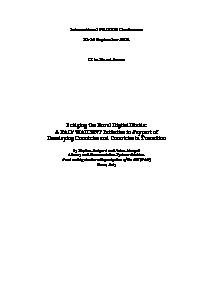
IT in Rural Areas
Rudgard, Stephen and Mangstl, Anton IT in Rural Areas., 2004 . In International PROGIS Conference, Woerthersee (Austria), 21-24 September 2004. [Conference paper]
Many agree that knowledge is central to development, and that there are considerable resources of knowledge and information that could be made available to assist poor people deal more effectively with the root causes of their poverty. The new information and communications technologies (ICT), and increased priority and resources for information exchange, have the potential to improve the access to, and benefits from, this accumulated knowledge for the rural poor, as well as creating a more informed policy environment. However, a “digital divide” separates those most in need from the world’s information and knowledge resources. The “Programme for Bridging the Rural Digital Divide to reduce Food Insecurity and Poverty” makes the case for a new strategic Programme through which FAO would facilitate a global partnership to address the rural digital divide. The Programme would strengthen human and institutional capacities to harness information and knowledge more effectively for agricultural and rural development. The proposal responds to a real gap, not yet addressed in a cohesive way by the international development community. The rural digital divide is not only a problem of infrastructure and connectivity, but a multi-faceted problem of ineffective knowledge exchange and management of content, lack of human resources and institutional capacity, compounded by an acute scarcity of financial resources.
